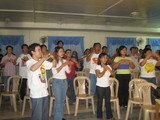
Ephesians 3, 2-12; Is 12, 2-6; Luke 12, 39-48: Privilege of Leadership
In his letter to the Ephesians, Paul uses the Greek word, polupoikilos to describe God’s grace. Polupoikilos is loosely translated as manifold or many-coloured. It means that God’s grace is suitable to all aspects and situations in life. God’s grace is thus true to any time, place, culture and event. Paul regards his privilege to preach the Word of God to all nations as a grace from God. He has extensively traveled and taught people of the magnificent application of the teaching of Christ to all aspects of life. He felt that God has revealed His plan to him that all men and women will soon be gathered as one in Christ. However, this privilege to preach God’s desire to gather all people did not make him proud but humble. He was amazed that this great desire of the Divine was revealed to someone like him. In the Gospel, Jesus answers Peter’s question to which the parable was addressed. Jesus said that the master will put the faithful and prudent steward in charge of his servants, and much is demanded of the leader who has been entrusted with more. As Paul envisions his leadership to be a privilege granted by God, he knew that his whole life is demanded of him.
Jesus is not a nagging dictator. Like a mentor who trusts his students, the master in the parable was not afraid to leave all his possessions to his servants to manage. The master in Jesus’ story left the managing of his properties to the creativity and initiative of his servants. I think this is advantageous to us: Jesus respects our will and person to be able to maneuver well in the specific vocation and responsibilities that are given to us. In the early Church, there were privileges for leadership. There were no specific instructions on how to address certain issues, such as the admittance of pagans in the Church, the relationship of the Church and the Jewish people, the way of enculturation of the Gospel without betraying it, proper behavior and ethics on married life, the organizational functions in hierarchy and the administration of the sacraments. In the modern world, the Church is faced with issues arising from present day technology such as cloning, genetic manipulation, population, sexual conduct, nuclear power plants, contraceptives, etc. Jesus left to his disciples and to us, the care of inventing solutions to these problems. Thus, Jesus, like the master, relies on our initiatives. In the Gospel of John, Jesus said, “It is to your advantage that I go away” so that the Spirit comes. And when the Spirit comes, He will soon guide us in our decision-making and our response to the challenges of today to our faith. Such freedom given to us is indeed risky, but Jesus takes the risk --- He gives us, as Paul saw it, the privilege and opportunity to use our freedom in the exercise of our responsibility.
A final point. The master in the parable remains the master, the steward’s actions still is in the image of his master. And thus the servant must take on the mind of his master so that in the administration of his master’s property, he continually asks himself how his master would manage it, if he were present. The steward’s decisions are at the service of his master. So that if applied to all Christian leaders --- the Pope, the bishops, the priests, lay leaders--- all should function in line with the values and vision of Jesus. Practically, all of us have been entrusted some form of authority over another, as parents are to their children, teachers to students, student leaders to the student body. However, the exercise of these privileges is to serve. It is not for our prestige, and therefore, not a cause for pride.
There is an antidote for Christian leaders when in the brink of being proud for the privilege of leadership. A. Dudley Dennison Jr., in his book, Windows, Ladders and Bridges tells us:
Sometime when you’re feeling important,
Sometime when your ego’s way up;
Sometime when you take it for granted
That you are the prize winning “pup”;
Sometime when you feel that your absence
Would leave an unfillable hole,
Just follow these simple instructions,
And see how it humbles your soul:
Take a bucket and fill it with water,
Put your hand in it up to your wrist.
Now pull it out fast and the hole that remains
Is the measure of how you’ll be missed.
You may splash all you please as you enter,
And stir up the water galore,
But STOP and you’ll find in a minute,
It’s back where it was before.
*C5 and I giving the Liturgical Music Seminar in Pampanga
No comments:
Post a Comment